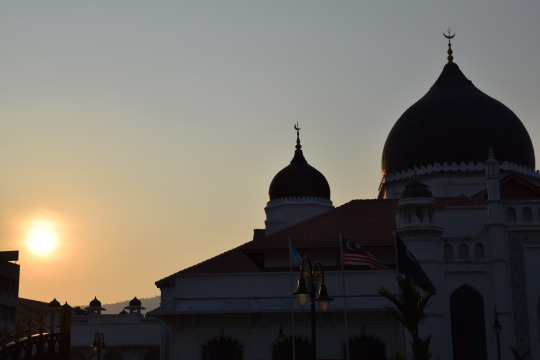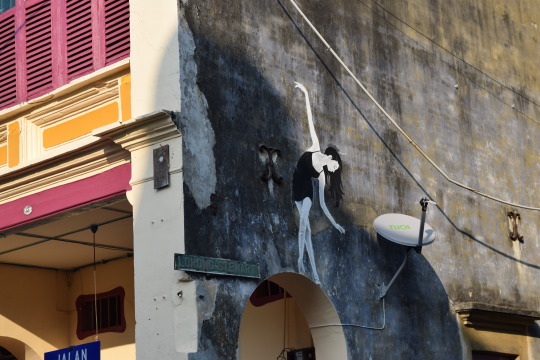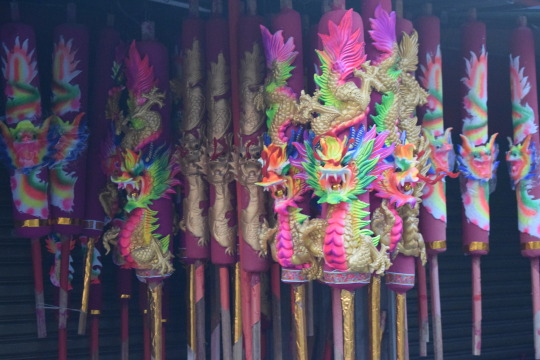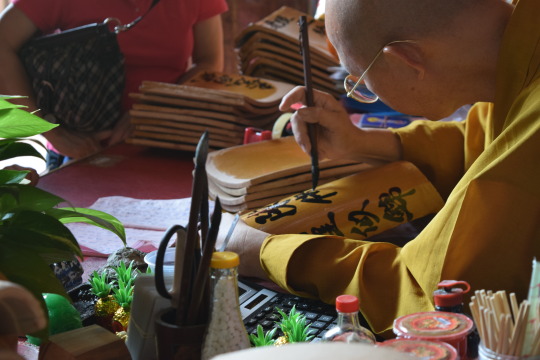sharing my thoughts about cultural challenges and the daily struggles
Don't wanna be here? Send us removal request.
Text
72 hours trapped (not an action movie)
For the past 72 hours I have been trapped in my room with a good cold, giving me a lot of time to sleep and to think (well, and to re-watch the first season of Gossip Girl). When you have a busy lifestyle, jumping from work to the gym, off to some social event and then back home to get some rest just before you have to get to work again, it leaves you with little time to think. You just try to manage everything, make the most of your time and focus on the things that are right in front of you. You rarely have 72 hours with nothing to do, no one to see and nowhere to go.
Well the last thing I was told, before I was sent to my quarantine, really has been going through my mind for the past few days. I was ironically bragging with the fact that “I never get ill!” when my colleague answered: “I also used to never get ill. Until I started working!”. It gave me a weird feeling. The same weird feeling I get whenever I talk to someone about the system we live in. And about how we choose to live in this “western” system and how we all kind of don’t want to be a part of this system. We kind of want to open a bar at a beach in Thailand or work in a hostel in the middle of the rainforest in Nicaragua. We only have these thoughts because we have travelled the world (or at least a tiny part of it), we have spoken to people that are living outside of that system – they inspire us and show us how our lives could look like.
Once in a while we catch ourselves dwelling in the memories of our travels, riding through stunning landscapes on scooters, diving in crystal clear waters, watching the sun set upon the calm sea with a cold beer in our hand. Really, it’s about the simple things: beautiful nature, fresh sweet fruit, having an interesting talk with a stranger. How can the simplest things give us so much happiness there – and “there” can be in many places… not only South East Asia – while here we are so caught up on so much stuff. Caught up on low carb meal prepping, way too much pressure at work and toxic relationships. It’s annoying, but me personally, I can’t help it. Even if I try to remind myself, I still get caught up in routine. Whenever I am back in this environment I can notice how I tend to fall back to this materialistic, self-centered, destructive person, who desperately needs a steep career, a shimmering social life and a 36-shade-eyeshadow-palette (the ones from Morphe are gorgeous btw!).
The wanderlust is itching and driving us nuts, some of us more than others. We ask ourselves: Who in his right mind would choose a life worrying about the right caption for the next product post over a life of doing something that really matters? A life of calorie counting over a life enjoying fresh local food? A life of a bunch of material possessions over a life without consumerism dragging you down?
I’m not saying we’re leading bad lives here (all the contrary!) or that we’re necessarily unhappy or less happy than we would be if we lived outside the system. All I’m saying is that, if you stop and think for 72 hours, you might question some of the things that we accept so naturally in our busy lifestyle.
What are your thoughts on this? Let me know!
0 notes
Text
who you are is where you come from (in a simple world)
It is February... again... everyone’s favourite month! Full of grey, cold, rainy days (yes, even in Madrid). The memories of the past christmas and NYE parties are already fading. The hope for spring has not yet sparked. Amid all this positivity, the new semester starts. A fresh start, excitement, motivation *yay*. With the new semester come new professors and with new professors comes this: “Ok, so if everyone could briefly introduce themselves... Say some words about who you are, where you come from.”
I absolutely hate this. How do you introduce yourself in one sentence? Have you ever thought about this? Ok so obviously, you say your name, which identifies you as who you are. No matter where or with who - your name is the possibly most important thing for the other person to know (although they probably forget it in the next second). But then, after that, you could say anything to introduce yourself, right? Hi my name is Anna and when I am drunk I transform into a blonde version of Rihanna. Highly inappropriate. Instead we say: Hi my name is Anna and I am from Germany.
We face exactly the same situation whenever we are in an environment with strangers from different countries. If you finally decide to walk up to someone, no matter if it’s during your semester abroad, if you’re backpacking or hear someone speaking English, the first question you ask is “Hey, where are you from?”. We could ask anything, really. Hey, what’s your name? - Nice to meet you Jessica, I’m Anna. Do you prefer Pepsi or Coke? But we unconsciously choose to ask where that person is from. ¿Por qué?
We might want to satisfy our urge to label people. This is not necessarily something completely bad. We meet someone we have never seen before and in order for our brain to deal with all this uncertainty we try to find out as much information about people with one single question. And where they are from, specifically the culture of their country, reveals a lot about them and gives you a guideline on how you should deal with that person. How close can I come both physically and emotionally? What kind of things can we talk about? How direct can I be? What kind of humour does this person have? If someone says they’re from Japan, you might not want to kiss them straight away. If they say they’re from the Netherlands you know they can take the ugly truth, no matter how direct you talk to them.
Now, this would be totally fine if we still lived in a world where you can make general assumptions about the culture of a country and project that on the individual. This system works in a simple world, where the Spanish are always late and the German are always punctual, where the French don’t drink wine for 1,89€ and the Italian don’t eat frozen pizza. But the truth is that we live in a world where Russian girls have British accents (because they have lived most of their lives in GB) and Swedish boys speak fluent Arabic (because their origins are from Morocco). We are a generation that has mixed origins and multiple nationalities, a generation that travels, that studies and interns abroad - doesn't this influence us and our culture enormously? To an extent that we can no longer identify our personalities with our “homeland”-culture? If the concept of nationality is so complex, how can we simplify it that radically and still say that’s ok?
There is a part of our brain that thinks in a complex way and another part that counteracts it, trying to simplify everything (I must admit I am reading Thinking fast and slow by Kahnemann). If we try to simplify the world too much, we lose track of reality though. Cultural models, such as our dear Hofstede’s cultural dimensions, have a purpose: when you try to talk about an extremely sensitive and complicated topic, they help you simplify and understand it in general terms. Still, I think there are little fields where theory differs that much from reality. In a world like ours nationality is not simple anymore, only in exceptions. Culture and nationality are starting to lose their importance and who you really are is starting to become truly important.
For me, Where are you from? is not a simple but a complicated and also sensitive question. I don’t think we realise that there are a lot of people who cannot or do not want to answer this question with a simple answer. And we should not force them to. Because who we are is not where we are from, at least not in my reality.
0 notes
Text
Awkward moments only Greek-Germans can relate to
As a Greek person growing up in Germany I must admit, the struggle is real. The differences in culture and mindset are sometimes so extreme that it’s hard to believe these countries are on the same continent. We - the German Greeks, the Greek Germans, whatever you want to call it - have to endure the inbetween, constantly torn between souvlaki and Currywurst. So for my fellow inbetweeners, here are some awkward moments that I think we can all relate to.
That awkward moment...
...when your German friends ask you if you have any cousins
...when you’re in Greece and you’re not feeling well so you ask someone for Aspirin but your grandmother ends up calling your aunt to remove the evil eye from you
...when your German friends tell you that “it’s really important to them that everyone in their family respects their personal decisions and their privacy”
...when you have to explain your German friends that Greeks can drink coffee for three hours (chilling doesn’t even come close the the meaning of αράζω)
...when you have to explain your Greek friends that there is no Frappe or Freddo Espresso in Germany (”But then what do they drink when they go for a καφεδάκι?”)
...when you are in Greece and they ask you how Merkel is doing and they tell you to deliver some messages to Schäuble, as if every German knew them personally
...when you run out of cash and your German friends ask you if you want to borrow some money from them and crack up laughing
...when Easter in Greece means that your 50-people family is going to roast three lambs and two goats and all the German children get are some chocolate eggs, hidden in their garden
...when you have to learn the lyrics of all new Greek songs before going to Greece so that you can sing along when going out to impress your friends
...when your German friends say that “Gyros is the Greek version of Döner, right?”
...when you’re in Greece and they ask you what city in Germany you live in, because they have a cousin in Düsseldorf or because their uncle’s baker’s oldest son lives in München
...when you’re in Greece and they ask you if you prefer Greece or Germany (caution: it’s a trick question)
...when you go to a German supermarket and Feta is described as Balkan-Käse
...when your German friends ask you if you want to go with them on summer vacation to any place that is not Greece (how do you translate “Σαν την Χαλκιδική δεν έχει”?)
1 note
·
View note
Text
the most important things I learned studying abroad
As expected, most of the things I learned during my semester abroad - I did not learn them in University. I learned life lessons, gained self-confidence and realized a lot of things about myself and about life in general. Here are some of the most important things:
1. Be patient.
In Germany everything has to go fast, fast, fast. Now means now. 8:00 means 7:59. Deadline means deadline. You expect people to do everything as soon as possible, as efficient as possible.
While we Germans are probably the most punctual and efficient people on this planet, we might need to accept that there are cultures that do not value punctuality and efficiency as much as we do.
We criticized the Thai’s slowness, their passivity. We got angry whenever we would have to wait for our classmates to arrive sometimes 15, sometimes 45 minutes late to class. We could not understand why, in a restaurant we could not all get our meals at the same time, but some of us would have to wait 10 others 30 minutes. We shook our heads in dispair when three people completed a task in one whole day, that one more efficient person could have completed in 2 hours.
After some time in a “slower” culture, you finally begin to be patient, to slow down and to fully relax. Rushing less, enjoying more.
2. Surrender to the chaos.
Bangkok is the city with the world’s longest place name (there is even a song people get taught at school to remember the full name) and I would not be surprised if parts of the name translated as “city of chaos”. Because, when you first arrive, everywhere you look, you see chaos: tons of people, chaotic traffic, no forms of organization or system.
And don’t let these hippie backpackers convince you that “Being lost is a truly amazing feeling, Anna. You just have to surrender to the chaos. Not everyone who wanders is lost.” Oh really?! Because if you find yourself in the middle of Bangkok and you’re lost, and you have no GPS, and no one can help you because no one speaks English, and it’s 40°C with a 90% humidity, and you actually have to get somewhere - then let me tell you how “amazing this feeling is” (it’s not).
After some time you start to see a certain order in what seemed a disorder. The traffic does not seem so crazy anymore. You get used to feeling lost, up to the point that it does not surprise you anymore, like Oh, I don’t know where I am again, alright nevermind and you will find a way of orientating yourself - or you will find the next true shop and top up your internet, so that you can finally use GPS!
3. You can communicate with everyone (if you really, really want to)
Was it naive of me to believe that everyone in Asia speaks English? Hmm... maybe. When I realized that I should have learned a few basic words and sentences in the local language, it was already too late and I was afraid that I would be unable to communicate with a large part of the population in a proper way.
So, instead of learning Thai, which would have probably taken me some time and effort, I decided to master the art of non-verbal communication. It is amazing how far you can get with gestures and pointing.
Also, it’s surprising how much better people understand you if you start decomposing your regular sentences into a sort of fragmented English. “Do you know where the Thonburi Train Station is, please?” translates into “Train Station Thonburi, you know, okay?”. If you want to say: “Could you give us a better price on this pair of shoes, please?” you should rather go for: “Discount for me okay my friend?”. “Do the bus tickets include the transfer, or do I need to pay extra for that?” would sound something like “Ticket same same transfer?”
4. You are so much stronger than you think.
When I left for Thailand I was scared and, to be honest, there were a lot of moments when I thought I couldn’t make it. But it turns out that I am capable of much more than I ever imagined and that I am more independent than I thought. I always thought that travelling would be hard, that it would be difficult for me to find food I liked, or a hostel that would be comfortable enough for me (I laugh at that thought now). I was afraid I would get stuck somewhere or something bad would happen to me. Somehow, though, you always manage to move forward, and somehow - don’t ask me how - it all works out eventually. I used to be scared to ask the waitress for some more ketchup and now you could drop me in a country I’ve never been before, with people I’ve never met and I can tell you for sure that I would be able to cope. Somehow.
5. Feeling helpless feels really, really bad.
I’ve met the most amazing, helpful people during my semester abroad and I am truly grateful for every single one of those people who were so friendly and great to me. Unfortunately, I’ve had some negative experiences as well. I have been scammed, lied at and ignored in moments when I needed help. These moments when you know you are paying double, even triple the price and you can’t do a thing about it. These moments when you have been trying to get a cab for over an hour, but for some reason no taxi driver wants to stop, and if they stop they don’t even try to understand where you want to go (and in the meantime the Monsoon is giving it’s all to get you soaking wet). Or when you are desperate because, all you’re trying to do is get some food and you ask yourself why an international supermarket cannot manage to label the groceries in English letters. Or when you realize the other person is ruthlessly taking advantage of the fact that you are a foreigner. These are the moments you just can’t do anything about it, and you are truly helpless.
But what really made me sad about all of this is that I realized that this is exactly the way that foreigners in Germany must feel: helpless. Especially because Germany is not the easiest of all countries to live in, and Germans aren’t exactly the friendliest of all people. I hope that from now on I will be more sensitive to helping foreigners in our country find their way.
6. All cultures are same same but different.
Growing up in a western country, all we learn about, all we hear about, all we basically care about are western countries. In school we are not taught to see the bigger picture, but to keep focused on our own business, our own way of life - our culture being the one and only. We learn about European and American history, while we haven’t even heard of the major historic events in Asia, Africa or Latin America. In the media, we barely see what everyday life is like in the rest of the world. Turns out, Europe is not the center of the world. And it is only by getting out there that we get an impression of what it’s really like. It is by interacting with the people that we set aside stereotypes and prove prejudices wrong (or right sometimes). Only by traveling we get to really see that there is so much more than just Europe on this planet, a completely different way of life, different way of seeing things. There are other ways of getting things done and leading a happy life and these ways are just as good as our ways.
You don’t only see the differences but, more important, you get to see the similarities between humans. Because after all, that’s what we all are: humans. No matter where you go in this world: Mommies love their babies, children run around their parents (annoying the heck out of them), women go get their nails done and complain they have nothing to wear, men try to act tough, couples fight because of jealousy. There are so many things that unite us even though we live on opposite sides of this planet. We are not that different. As the Dalai Lama once said, we are all just trying to find happiness and avoid suffering.
Well, here you have it, that’s how my semester abroad broadened my horizon, even if it was just a little bit.
1 note
·
View note
Text
8 things I will miss about Thailand
As my semester abroad in Bangkok is coming to an end I am excited to go back home to see my family and friends again - but there are also soooo many things that I will definitely miss. Here I have listed the top eight:
8. The weather
Although it can get really hot and the humidity makes you sweat 24/7, I will definitely miss the weather in Thailand. Just the fact that you can wear shorts and summer dresses every day at all times without worrying about getting cold (except if the a/c is going crazy again) is amazing. Also, it makes every day a pool day - which brings me to the next point...
7. My condo
For four months I have been living in a beautiful apartment with an outside pool and a gym. It feels so good to finish a nice, good workout by jumping into the cold pool and swimming a little bit to relax your muscles. And there is nothing more relaxing than having a lazy (hangover) sunday by the pool, tanning and drinking Iced Pineapple Smoothies.
6. Feeling like you’re famous
In many parts of South East Asia, but even more so in China, I have often had people staring at me and wanting to take pictures with me, just because I am a Westerner. And every other Westerner has probably had similar experiences here. With pale skin, light hair and light eyes we just look different, so especially people who aren’t around foreigners a lot like to take pictures, which feels weird at first, but is kind of cute and funny at the same time. And I could actually get used to random people telling me I’m pretty all the time...
5. The challenges
This one is actually a little tricky, because on one hand you want things to work out easily but on the other hand you do enjoy the little challenges that Asia gives you. Mainly because of language and culture barriers, doing the most simple things can turn out quite difficult. Ordering food without being able to read the menu. Catching a cab without being able to communicate with the driver. Trying to explain that you need your team to finish a project until tomorrow (no, not the day after tomorrow, not next week, oh, come on guys start working we have a deadline!!!). Small, and big, challenges like these spice up your life and keep your adrenalin level high. If everything would come out easily it would be boring right?
4. The smiles
I know, the Thai smile can mean a lot of different things and it can often not be what it seems. It can be a happy, sad, upset, fake or just polite smile. But coming from a country in which it is not common at all to smile a lot, I must say that I really like it. Being constantly smiled at just puts me in a good mood and makes me want to be a friendlier person.
3. The easy-going lifestyle
I think it is safe to say that Germany is the least easy-going country in the world: If you break the rules (and by breaking the rules I mean things like crossing the street on a red light) or if you are late (and I mean 3 minutes late) you are usually in trouble. In Germany you make plans and you stick to them, no matter what. In Thailand, well... don’t even bother to make a plan. Because everything will turn out differently anyways! Sometimes this can be very annoying, but once you relax a little bit and start taking things easier, you can just enjoy a laid-back atmosphere and be less stressed about stupid things.
2. Travelling
Bangkok has one of the best locations to travel around South East Asia for long as well as for shorter trips. Within hours you can reach the most beautiful places and meet the greatest people! The amazing thing about it is that you can just do things spontaneously. One time it turned out that I had an unexpected week off. So I just packed my backpack with a little bit of everything and went to the Hua Lampong train station, with no idea where my journey would take me - 12 hours later I am enjoying a cold “Angkor” beer in Siem Reap, Cambodia. Another time, we would just decide to take a weekend break and take a minibus to Trat, from where in just a few hours you can find yourself on the beautiful, sandy beaches of Koh Chang. I will definitely miss the spontaneous, adventurous and cheap travelling of South East Asia so much! But there is one thing I might miss a tiny bit more...
1. The food
While I was living on only three dishes the first few weeks (chicken rice, fried rice with chicken, fried chicken on rice) I slowly opened myself up to discover more and more of the incredibly delicious Thai cuisine. Pad thai, noodle soup, chicken curry, coconut milk soup with chicken, shrimps with garlic on rice, mango sticky rice, thai pancake, barbecue beef with sticky rice, ... And you can get the best food on the streets, for sometimes less than a euro, at all times of the day. Going out with a good group of friends and sitting on the corner of a street on plastic chairs with an ice cold Chang beer on a warm night enjoying the best Thai food... that’s maybe the thing that I will miss the most.
0 notes
Text
why Germany might do better as a fruit salad than as a smoothie (or: how Malaysia impressed me)
A few weeks ago I visited an old friend in Malaysia and we had a road trip through the country. In the limited time we had, we saw so many interesting things, ate so many different types of food and took so many pictures with the coolest street art Malaysia has to offer. Besides amazing architecture, delicious meals, hikes through beautiful landscapes and white coffee in cute cafés, what impressed me the most was an incredible cultural diversity like I have never seen it before.
Malaysia is a multiethnic country with a population which consists of three main ethnic groups: Over 50% are Malay, while Malaysians of Chinese descent make up 25% and Malaysians of Indian descent around 10% of the population. With these ethnic groups come four world religions (Islam, Buddhism, Hinduism and Christianity) and an infinite variety of traditions, festivals, customs and - of course - food. We would walk through the street of harmony in Georgetown, Penang and find a baptist church, a Chinese buddhist temple, a hinduist temple and a mosque within 10 minute walking distance!
Different rules apply for the different ethnic groups: you will never find any beef in the Indian parts of the city, but you will find saris in vibrant colors and cinemas displaying the newest Bollywood movies. You can be sure that all your meals will be halal in any Malay restaurant, but you will have to pass on the alcohol here. If you are looking for a slice of delicous roasted duck, or if you want to push your culinary boundaries trying some chicken feet or frog porridge - then it’s time to take a walk through Chinatown!
As if this wasn’t enough of a cultural mix, you can also see Persian, Arabic and British influence in culture. Close to Malacca there is even a small community of descendants of former Portuguese colonists! I had some moments when I was slightly confused (and I partially blame the 40°C weather for that!): the architecture is a combination of so many styles, from Islamic over Chinese styles to those styles brought by European colonists, that you don’t know what country you’re in right now - is this 19th century Britain? or the Middle East? or China? Some fresh, warm naan bread with curry would usually help me regain energy and clear up my confusion.
Especially after a few months in Thailand it was incredibly refreshing for me to experience an environment where different cultures come together. It is said that Thailand is South East Asia’s most ethnically homogeneous nation, plus it has a very low English proficiency rate, which can be annoying from time to time. So after some time in Bangkok, it was a nice change to be able to communicate with people in proper English (although I’ve become pretty good at imitating chicken in our university canteen to get my fried chicken with rice - who needs words anyways?).
Obviously, there will be problems when ethnic groups with so different mind sets have to live together. But, for me, cultural diversity brings innumerable benefits and I can’t understand how so many people can be disapproving of it. Even in Europe, with the current refugee crisis going on, I feel like we should all take a look at Malaysia - maybe they can teach us how to deal with a multiethnic, multilingual and multicultural population. Even though it is important to make sure people of different cultural groups interact with each other and ethnic minorities integrate themselves, I feel like it is just as important to grant people their freedom of religion and the freedom to practice their own traditions and lifestyles. The melting pot idea, originating in the US, describes different ethnities melting together to one national unity - but shouldn’t we rather work towards multiculturalism than force a complete cultural assimilation and adaptation? I guess this will only work if we finally learn to respect and, most of all, to embrace the differences between cultures. With globalization, multiculturalism is inevitably coming towards us and we have to figure out not only how to deal with it, but how to get the best out of it. By learning about a different religions, different customs and different mind sets and traveling to explore different cultures we can all become more open minded. Until now, I have been lucky to have met some awesome friends from different countries who have explained their cultures and beliefs to me and thus made me a little less naive...
I always thought blending different cultures together, like different pieces of fruit in a smoothie, is the best way to unite these cultures. However, creating a fruit salad, in which every fruit can keep its own taste, shape and colour, could be a better option. Because, with a smoothie you might get a nice, creamy, homogeneous texture - but in exchange you lose some valuable vitamins!
2 notes
·
View notes
Text
the story of the two germans (or: same same but different)
On the second night in Bangkok I was getting some thai pancake, when I noticed two guys staring at me from the other side of the street. I went over to them and asked if I could help them in any way. Turns out they were from Germany and we were living in the same hostel. In the authentic Thai neighborhood of Ramkhamhaeng, which lies slightly outside of Bangkok, it's perfectly easy to feel lost: No one here speaks English, the food is not adapted to tourist standards, while street directions or any kind of helping orientation are basically non-existent.
They looked at me with big eyes and asked if I knew a restaurant around here, as they were sick of street food. I said I woud try my best, but I couldn't promise anything. We didn't find a restaurant but eventually sat down in a small alley where a woman was selling chicken with rice on the street.
The two boys were around my age and had just done a Southeast Asia trip, Bangkok being their last stop before returning to Germany. As they were telling me about their journeys, I started noticing something funny. One of them always remarked the bad things about travelling while the other was enthusiastically talking about the good parts.
So when I asked: How was Malaysia? One of them started daydreaming about the diverse culture, the vibrant capital and the delicious food. The other just said, that it would have been quite nice, if they had only stayed in an acceptable hotel.
When I asked about Indonesia, one of them described the clear blue water, the soft sand beaches and the palm trees swaying in the warm summer wind. The other criticized the expensive prices in some tourist areas.
Cambodia, according to one of them was a beautiful country with loving people, impressive temples and stunning landscapes of rice fields, whereas the other just remembered the hot and far too moist climate.
Finally we came to speak about Thailand. Now, the complaints were accumulating: The food is not hygenic whatsoever, plus it's just disgusting. The Thai people just pretend to be nice and then try to take as much as possible from your money. The streets are dirty and filled with cockroaches and rats. Boy, was this guy happy to get back home to Germany. His friend said nothing this time, I think he had started to feel a bit stupid.
I started to doubt that they had even been on the same trip. For one of them the trip was an amazing experience, for the other it seemed like a nightmare. So I wondered: These two Germans had been on the exact same trip, they had slept in the same hotel, had swum on the same beaches and had eaten the same food for the past month. But they perceived it completely differently. As the Thais like to say: Same Same, But Different!
I realised, it's not what happens but the way you interpret what happens that determines your happiness. Your character, your background and your previous experiences influence your perception of events to a great extent. This way a negative atttitude can keep you from having an amazing time, making you feel miserable even if you're lying on a white sanded beach with a Mojito in your hand and the sound of the ocean waves in your ears.
It's in our hands how we deal with the things that happen to us. It's our own responsability to be happy by seeing the bright side in things. We should not blame the circumstances��for our bad mood. Instead of trying to change our surroundings we should try to change our perspective. Of course it can be hard to handle bad situations with a positive attitude and to create good feelings even when we are annoyed or sad. But, if we don't want to end like the grumpy German boy from this story, we should at least try.
1 note
·
View note
Photo
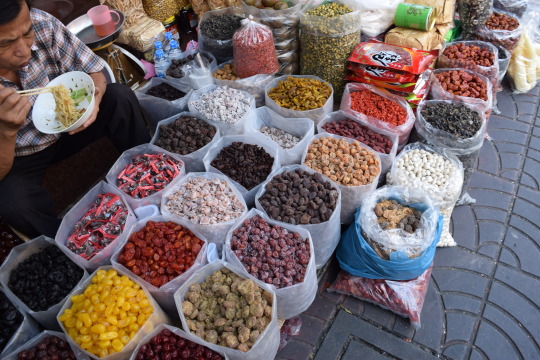
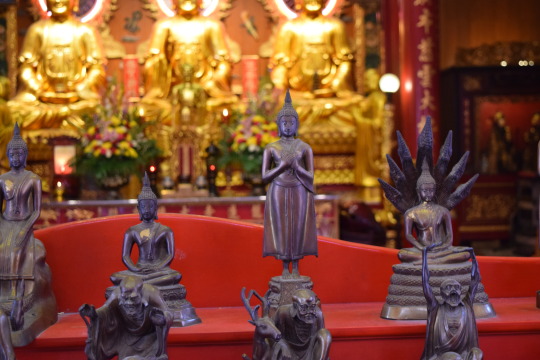
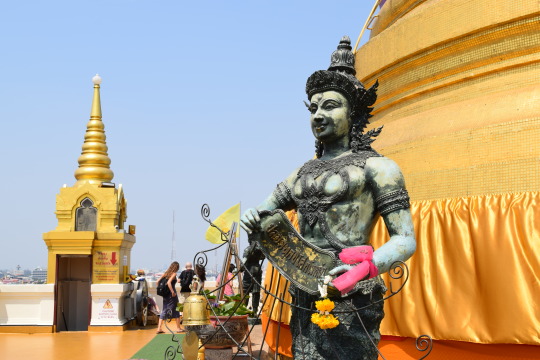
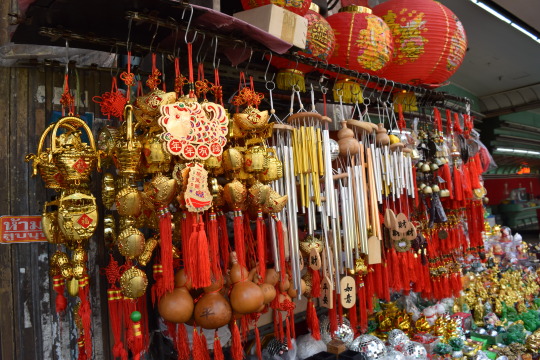
1 note
·
View note
Text
the ups and the downs of a first day (or: I can't live in this city)
Today was my first day in Bangkok. My first day in this insanely big, colourful, loud, beautiful, crazy city. The first day of an experience that I am supposed to turn into some kind of adventure of a lifetime (at least that's what I heard). Of course this particular first day decided to mess with me and ended up being an especially hard one.
After a wonderful combination of two six hour flights, with a calm transfer in Doha, Qatar (I really, really love flying to be honest) my friend Sarah and I arrived in the capital of the Kingdom of Thailand: Bangkok. The minute we stepped foot on this city I couldn't believe I was finally here. I had been looking forward to this trip for months and I was terribly excited. It felt like a dream come true. All of the expectations I had for this journey were shooting through my mind like bullets. And I was so ready to go!
We couldn't check in at the hostel, because we were too early, so we had 5 hours to kill. We left our luggage at the hostel and decided to go check out the University and get registered at the International Office. We kind of could have known that you don't just "check out" a University with 525.000 students. Nor do you just "find the International Office" on a campus, that's as big as a small city, with no knowledge whatsoever of the Thai language.
Trying to find this International Office was as frustrating as it was challenging. The few maps you can find on campus are written in Thai, thus impossible for us to understand. We asked dozens of students to help us, none of them knew where the Office was or could speak or even understand English. We walked around campus for more than an hour - sweating excessively due to the heat, the humidity, our warm clothes and the backpacks we were still carrying around. When we found the International Office turns out it was closed due to a national holiday.
"Keep smiling", we thought, exhausted and still suffering from the heat, "let's go find a nice apartment to cheer us up" (as if it had been so easy to find the International Office, now it would be easy to find a place to live for the next four months). After some hours of wandering around with little to no orientation and being incredibly indecisive, we returned to the hostel and took a cold, well-deserved shower to wash away the slight frustration we experienced just that morning.
As we went out for another walk in the afternoon, we looked at the people, at the traffic, at the food, at the stores, at everything around us and then, when we looked at each other the same thought came through our minds. And we were almost unable to say it out loud: We couldn't image ourselves living in this city for the next four months. We couldn't imagine ourselves being able to deal with all this chaos. With all these new rules and ways of living. With this culture, that is as different as a culture can be to the German one, the one we are so used to and comfortable with. The truth is that we were, and by the way still are (all of this happened like an hour ago), immensly overwhelmed. Overwhelmed by thousands of impressions, hundreds of sensations and a sudden reality that is equally beautiful and scary. Though, this reality has nothing to do with the picture painted in our heads, with the expectations made up by our minds. We weren't ready for all of this.
This first day made me realize I was wrong to think I could handle a cultre shock so easily. It made me feel intimidated and shocked but happy and excited at the same time. It made me reach a point were I had to admit to myself and to the rest of the world (adding a little drama to the last paragraph) that I was simply overwhelmed with the situation.
Good news is, the first day is over. And I am just too curious to see what the rest of the days of this so-called adventure will bring to me.
0 notes
Text
the 3 emotional stages of moving to a new city (or: how to move away from a city you have come to love)
I recently moved back home as I finished my studies in Koblenz after two and a half years and I must say: I was surprised that my emotional reaction to all of this moving around is so strong. I thought I could easily handle it, that I wouldn’t shed a tear, that none of this would emotionally affect me. But, as so many times before, I was wrong.
Stage 1: Excitement
When you move to a new city, everything new is exciting. It’s the first time you go to this unknown club, the first time you get to discover the city’s streets and shops, the first new people you meet at university. You have some trouble figuring out how the city works: you don’t know the bus schedule yet and you get lost trying to find that bar you went to the other day. But everything you see is unknown and you are excited to be in a new place with lots of new people. When it comes to me, I was living alone for the first time and fully enjoying the benefits of that - coming home ridiculously late, pretending to be an adult (=drinking white wine on weekdays and cooking meals involving seafood) and leaving my room so messy until you couldn’t see the floor.
Stage 2: Getting used to it
In a small city like Koblenz it takes only a few months to discover most parts of the city. After that, you have been to most of the bars, you’ve eaten at most of the restaurants and you’ve met most of the people that you will meet. The excitement of the beginning has faded and maybe you feel a little disappointed - I certainly was disappointed: Koblenz doesn't have that much to offer when it comes to culture and variety of activities, plus I was frustrated with University, which did not fullfill my expectations at all. What I wanted was interesting discussions, inspiring classes and passionate professors. What I got was bored students, boring subjects and learning by heart (a lot of learning by heart). Welcome to the reality of studying business.
Once you realize this is actually going to be your life for the next few years, you get used to everything. And the city you live in starts to be your home.
Stage 3: Saying goodbye
When it comes to moving away you suddenly realize that, although there are so many things you don’t like about this city you're living in, you have somehow come to love it. While you would always get angry about how the busses come only once an hour on sundays, you would suddenly realize that you know most of the bus drivers in Koblenz and that waiting for the bus patiently isn't too bad after all. The grey streets of the Altstadt turn from sad to nostalgically beautiful. You even start to see your friends differently, because you realize you will miss a lot of people. This phenomenon occurs whenever you choose to change something in your life. You start to look at everything through rose-tinted glasses: That job you wanted to quit, isn't that boring. The studies you wanted to drop are kind of interesting in the end. The city you wanted to move away from isn't too bad after all.
But once you put away your rose-tinted glasses you see the reality: That it's time for you to move on.
So I gave up my room in the dorms, said goodbye to my friends, wiped the tears of my face and packed my suitcases for Bangkok.
0 notes
Photo
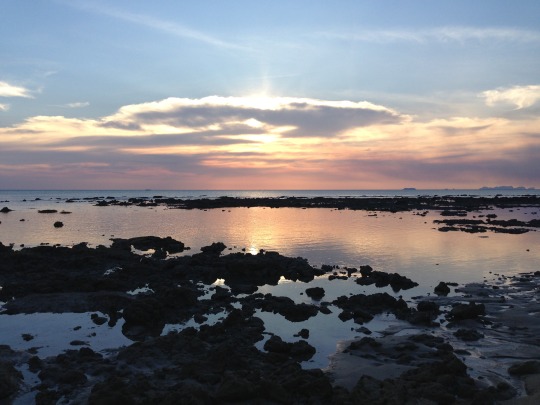
March 2015, Koh Lanta, Thailand
0 notes
